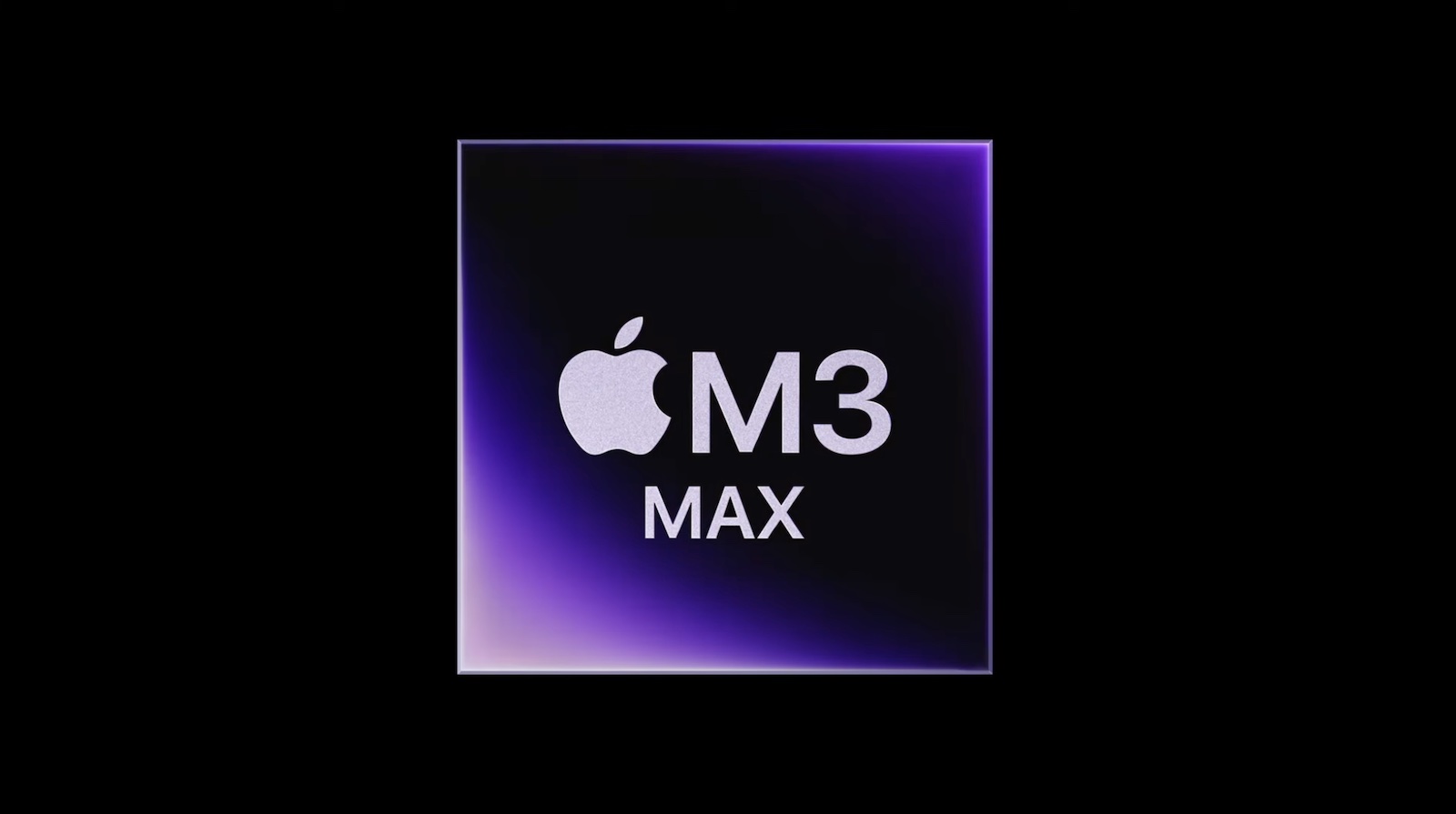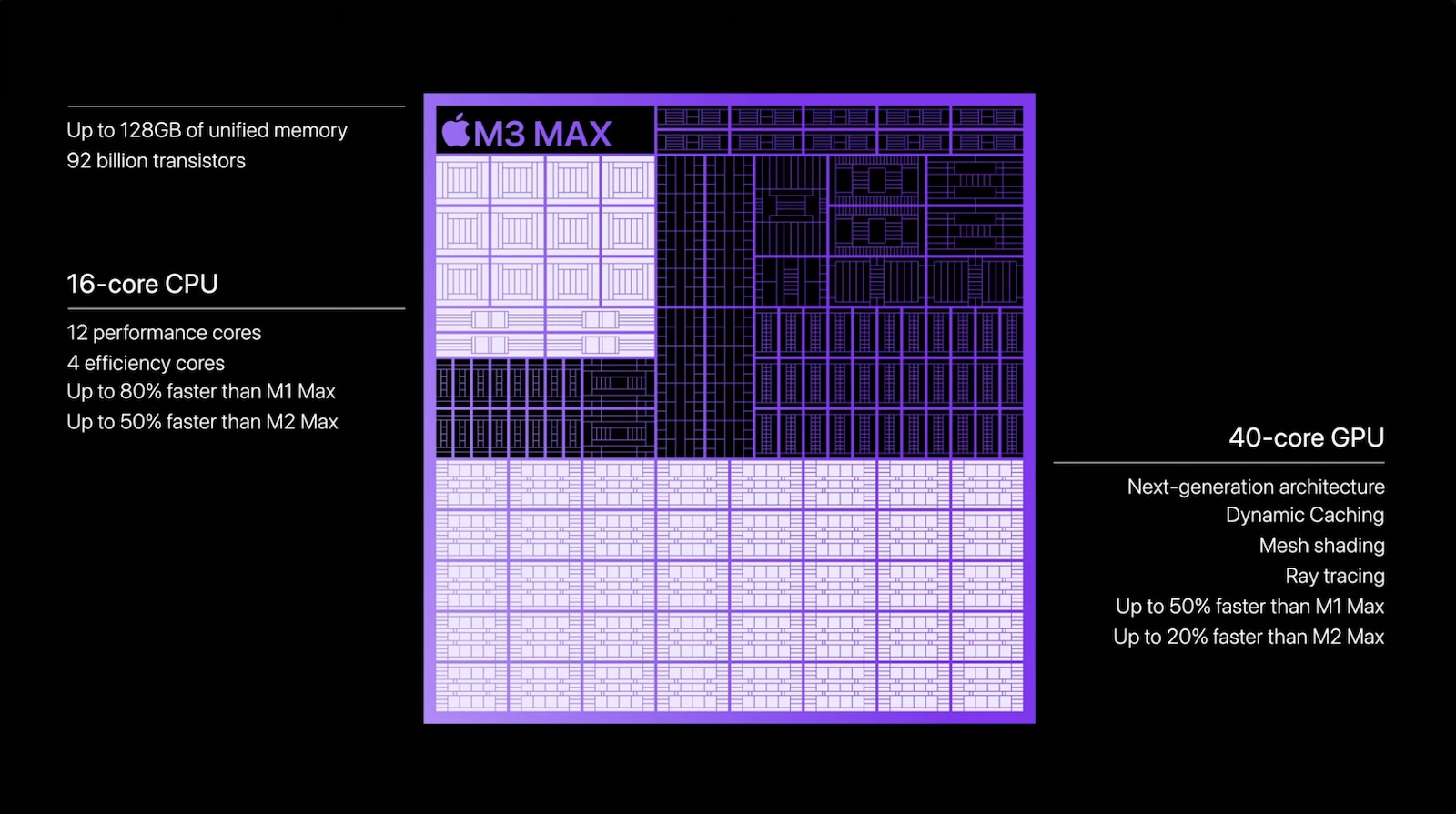Got a tip for us?
Let us know
Become a MacRumors Supporter for $50/year with no ads, ability to filter front page stories, and private forums.
M3 Max Chip Around as Fast as M2 Ultra in Early Benchmark Results
- Thread starter MacRumors
- Start date
- Sort by reaction score
You are using an out of date browser. It may not display this or other websites correctly.
You should upgrade or use an alternative browser.
You should upgrade or use an alternative browser.
Here’s your reminder that Intel passed on Johny Srouji for their CEO role in 2019.
How long is it usually after launch before machines turn up on the refurb store? Specifically the UK
It depends on how many are returned to Apple. For popular in demand computer models / specs, you rarely see many in the refurb store and it takes awhile before you even see them.
That's because you think like a software engineer, not like a professor who learned coding in a certain way and it's just a necessary evil for her/him, and he/she is the one with the grant money who's kind enough to let you use their hardware for your researchI would wager if it hasn't been ported to GPU, it probably also doesn't scale well to 96 cores…
That's because you think like a software engineer, not like a professor who learned coding in a certain way and it's just a necessary evil for her/him, and he/she is the one with the grant money who's kind enough to let you use their hardware for your researchAnd btw multi-cpu systems are much older than multi-core cpus or gpu programming.
I mean, I've seen code written by academics and it tends to be terrible, and I just can't imagine it scaling well.
But I could be wrong!
Of course. Apple can push all the fancy charts they want, but they can’t escape reality. The heatsink on the top specced out studios weigh about as much as an entry level MacBook Air.Curious as not an expert on the Mac hardware side of things, but would an M3 max in a laptop throttle before an M2 Ultra in a Studio ?
Just wondering if was going to push it regularly if sustained higher speeds would be the same between the two ?
edit: In fact does anyone have that exact number? I know the bump up adds ~2lbs or so over the aluminum heatsink, but has anyone ripped both of them out and weighed them? That copper one might indeed weigh more than a 13" M2 MacBook Air.
I’ve heard reports on other M-series chips being hard to get up to a point that they would throttle at all. Or even spin up the fans under load. Not sure about the M3 but my M1 Max Mac Studio doesn’t even spin up the fans playing a AAA game like Resident Evil Village in 4K high settings.Curious as not an expert on the Mac hardware side of things, but would an M3 max in a laptop throttle before an M2 Ultra in a Studio ?
Just wondering if was going to push it regularly if sustained higher speeds would be the same between the two ?
Did they pull the scores from the website? I thought I saw them last night and now they aren’t there.
It makes the M2 Ultra Mac Pro looks silly.
I do really hope they have something more exciting planned for the Mac Pro, like what was rumored for the M2 Extreme or whatever they wanna call 4 of the SoC's fused together.
Now that would be something a bit more powerful.
Hopefully people who are using a M2 Ultra Mac Pro are busy making money with it than being glued to Macrumors freaking out.
M3 Ultra will have 256 GB? Not sure if that’s going to make everyone happy, but it something.
will safari scroll faster?
This is affected more by how fast you flick your finger on the mouse or trackpad, ie. the condition of your neural-physical pathways, than the speed of M3 processors.
Don’t even mention the $1000 for 128GB RAM “upgrade” price, which is a shared ram on top.(Un)fortunately, they didn’t charge $12000 for 8TB upgrade from base.
For that price i get nearly 400GB RAM unshared on other platforms.
Hmm. To me, the M1 Max and M2 Max seemed like a waste for my use case (software development), because the CPU part was virtually identical (memory memory bandwidth, but you can't really saturate it), and I don't need more GPU cores. Except, the Max offers more RAM. But aside from the RAM, it was as a pretty easy "yeah, I'll go with Pro".
The M3 Pro vs. Max complicates this.
I wonder if the M4 or so will give more choices. I really don't need those GPU cores, but I would benefit from more CPU cores.
If you are doing compiles, multicore performance is the most directly related benchmark to compile times.
But now you get GPU dynamic caching which is basically a fudge to get around crappy shared memory, while other platforms have 16gb plus of dedicated GPU memory. 8gb RAM is a joke, especially when it’s shared with the GPU. In fact even 16gb is.Don’t even mention the $1000 for 128GB RAM “upgrade” price, which is a shared ram on top.
For that price i get nearly 400GB RAM unshared on other platforms.
They're findable on Geekbench search, under "Mac15,9" as they don't have system names mapped yet.Did they pull the scores from the website? I thought I saw them last night and now they aren’t there.
Geekbench Search - Geekbench
The real hurdle for me to enjoy this new processor is the absurd upgrade price to 4TB of storage.
That’s like the silliest complaint ever. Apples SSDs are ultra high performance as long as you get a 1TB or higher that can saturate the IO channel. But they clearly mark the bigger ones up, so it doesn’t make any sense to go beyond the 1TB unless you really need that extra storage internally. Instead get a cheap 8TB external for things you don’t use much.
But now you get GPU dynamic caching which is basically a fudge to get around crappy shared memory, while other platforms have 16gb plus of dedicated GPU memory. 8gb RAM is a joke, especially when it’s shared with the GPU. In fact even 16gb is.
Again, a silly criticism. 8GB is more than enough for some users, even with shared memory that is well worth it because it enables best in class performance and battery life.
Apple should offer more options to uses not less. For someone like you who feels they need more memory because it’s shared, there’s a 24Gb option. Or for same price as 24Gb MBP 14, you can get a Pro w/18GB.
Note that this is just CPU power - the M3 Max has a lot more CPU cores, but about the same number of GPU cores. I doubt it can compete with the M2 Ultra on GPU."The new 16-inch MacBook Pro starts at $3,499 in the U.S. when configured with the M3 Max chip, while the Mac Studio with the M2 Ultra chip starts at $3,999, so you can effectively get the same performance for $500 less ..."
Which points to a pretty quick upgrade timetable for the Studio? Which was already looking overpriced compared to the higher end Mac Minis.
I hope some NON-Graphics benchmarks come out because Apple in all the M-series is mainly boosting graphic performance. Then boost the clock rate some for non-graphics performance. Which I read they did again on the M3 like they did on the M2. Saw another site say they slowed the memory speed on the M3. Apple's done a lot of strange juggling on the M3 so have wait till people actually get the machines and start get real world results.
The first benchmark results for Apple's M3 Max chip surfaced in the Geekbench 6 database today, providing a look at CPU performance. Based on the "Mac15,9" model identifier shown, the results appear to be for the new 16-inch MacBook Pro.

The highest multi-core score for the M3 Max with a 16-core CPU is currently 21,084 as of writing. If this early result is accurate, this means the M3 Max is around as fast as the M2 Ultra chip, which has an average multi-core score of 21,182 in the Mac Pro and 21,316 in the Mac Studio, according to a chart on the Geekbench website.
The M3 Max in the new 16-inch MacBook Pro is around 45% faster than the M2 Max chip in the previous-generation 16-inch MacBook Pro, according to the Geekbench website. This is within the ballpark of Apple's claim that the M3 Max is up to 50% faster than the M2 Max, especially given variance in early Geekbench results.
Geekbench 6 multi-core scores for CPU performance:
Manufactured with TSMC's 3nm process, the M3 Max has up to a 16-core CPU with 12 performance cores and four efficiency cores. It also has up to a 40-core GPU and can be configured with up to 128GB of unified memory.
- M2 Ultra: 21,182 (Mac Pro, averaged)
- M3 Max: 21,084 (16-inch MacBook Pro, highest score listed so far)
- M2 Max: 14,495 (16-inch MacBook Pro, averaged)
- M1 Max: 12,185 (16-inch MacBook Pro, averaged)
- M3: 11,836 (14-inch MacBook Pro, highest score listed so far)

The new 16-inch MacBook Pro starts at $3,499 in the U.S. when configured with the M3 Max chip, while the Mac Studio with the M2 Ultra chip starts at $3,999, so you can effectively get the same performance for $500 less with the new 16-inch MacBook Pro, and do not need to supply your own display, keyboard, and mouse.
The first Geekbench 6 results for the standard M3 chip surfaced earlier today, revealing that it is up to 20% faster than the standard M2 chip. Benchmarks provide a useful reference point, but real-world performance can vary.
The new MacBook Pro models are now available to order, and most configurations will begin arriving to customers and launch in stores on Tuesday, November 7. M3 Max configurations will be available later in November.
Article Link: M3 Max Chip Around as Fast as M2 Ultra in Early Benchmark Results
I wish! thought Apple is quite good at keeping seeling outdated machines just because they have PCI or support for multiple monitors..."The new 16-inch MacBook Pro starts at $3,499 in the U.S. when configured with the M3 Max chip, while the Mac Studio with the M2 Ultra chip starts at $3,999, so you can effectively get the same performance for $500 less ..."
Which points to a pretty quick upgrade timetable for the Studio? Which was already looking overpriced compared to the higher end Mac Minis.
| Mac Studio Apple M1 Max @ 3.2 GHz (10 cores) | 12432 |
| Mac Studio (2023) Apple M2 Max @ 3.7 GHz (12 CPU cores, 30 GPU cores) | 14809 |
M3 Max 21,084
It took 6 years for Intel to make this jump with my previous machines :
| MacBook Pro (Retina) 2012 Intel Core i7-3720QM @ 2.6 GHz (4 cores) | 2255 |
| MacBook Pro (15-inch Mid 2018) Intel Core i7-8750H @ 2.2 GHz (6 cores) | 4851 |
though to be fair, the macbook also doubled the performance in single core, where M1 and M3 difference isnt too far, I hope M3 get mature so we can see a bigger jump in single core for M4
Yeah what i said was a response to someone calling the results fishy.I’m calling it now – nothing’s off, these 3nm chips are just incredible. Apple deserves massive credit for this beastly M3 Max. We’ll know for sure in a couple weeks!
Register on MacRumors! This sidebar will go away, and you'll see fewer ads.


